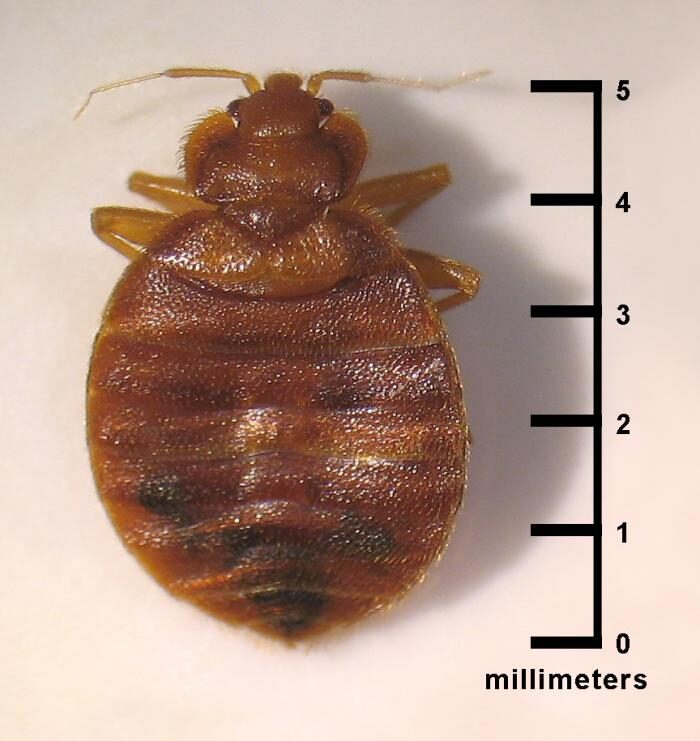Bed Bugs
Bed bugs are six-legged insects that feed on human blood during night-time hours and hide during the day. They are commonly found in large buildings such as apartments, dorms, prisons, hospitals and hotels; however, infestations can also occur in private homes as well.
Bed bugs are not known to transmit disease, but most people experience itching, pain and/or swelling of the skin where a bite occurs. Although they typically feed on blood every five to ten days, bed bugs are capable of surviving several months without feeding.
The Allen County Department of Health investigates complaints of bed bugs in lodging facilities and other settings. We can also provide information to help residents to get rid of bed bugs or prevent an infestation from occurring. To report a problem or for more information, please call 260.449.7459.

Infestation Signs
Bites are not always a good indicator of a bed bug infestation because they can look like bites from other insects like mosquitoes or chiggers, rashes like eczema or even hives. Some do not react to bed bug bites at all. When cleaning, changing bedding or staying away from home look for:
- Rusty, reddish stains on bed sheets or mattresses caused by crushed bed bugs.
- Dark spots, which are bed bug excrement that may bleed on fabric like a marker.
- Tiny eggs and shells (about 1mm) and pale yellow skins nymphs shed as they grow.
- Live bed bugs.

Prevention
A few simple precautions can help prevent bed bug infestations:
- Check secondhand furniture, beds and couches for signs of bed bugs before bringing home.
- Use protective cover to encase mattresses and box springs. Purchase a quality encasement resistant to tearing and check regularly for holes.
- Reduce clutter for fewer bed bug hiding places. Vacuum frequently and empty after.
- Be vigilant at shared laundry facilities. Transport items to be washed in plastic bags (use a new bag for the journey home if you have an infestation). Remove from dryer directly into bag and fold at home.
- Isolate your unit in a multi-family home. Install door sweeps to discourage movement into hallways. Seal cracks and crevices around baseboards, light sockets, etc., to discourage movement through walls.
- Discard infested furniture responsibly if not salvageable. Destroy it so someone else doesn't bring it home. Slash or rip covers and remove stuffing. Spray paint BED BUGS on items. Call your trash collection agency to have it picked up.
Bed Bug Control
While there is no quick fix, there are effective strategies to control bed bugs with both non-chemical and chemical methods.
- Heat-treat clothing, bedding and other items that can withstand a hot dryer. Putting items in a household dryer on high heat for 30 minutes will kill bed bugs and eggs. Washing alone might not. Store clean items in a sealed plastic bag to ensure they remain bug-free.
- Physically inspect and clean furniture, baseboards, behind outlet and switch covers, etc. to remove visible bed bugs or eggs. Remove and clean drapes and drapery hardware.
- Use sealed plastic bags to transport items from one area to another.
- Make your bed an island. Move it at least 6 inches from the wall. Place bed bug-proof covers on mattresses and box springs. Ensure bedding is tucked under the mattress and not touching the floor. Remove anything under the bed.
- Vacuum thoroughly and empty. Seal the vacuum bag or contents in a plastic bag and place in the trash outside.
- Use pesticides according to directions or hire a pest management professional. Look for EPA-registered pesticides with bed bugs listed on the label. Hiring a pest management professional as soon as possible may prevent the infestation from spreading.
- Continue to inspect for bed bugs at least every 7 days in case any eggs remained. Re-treat as necessary.